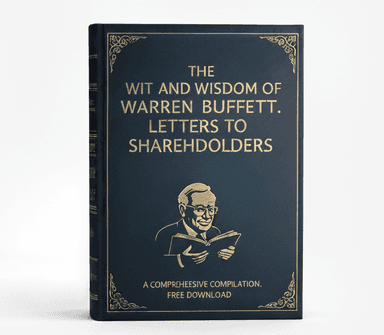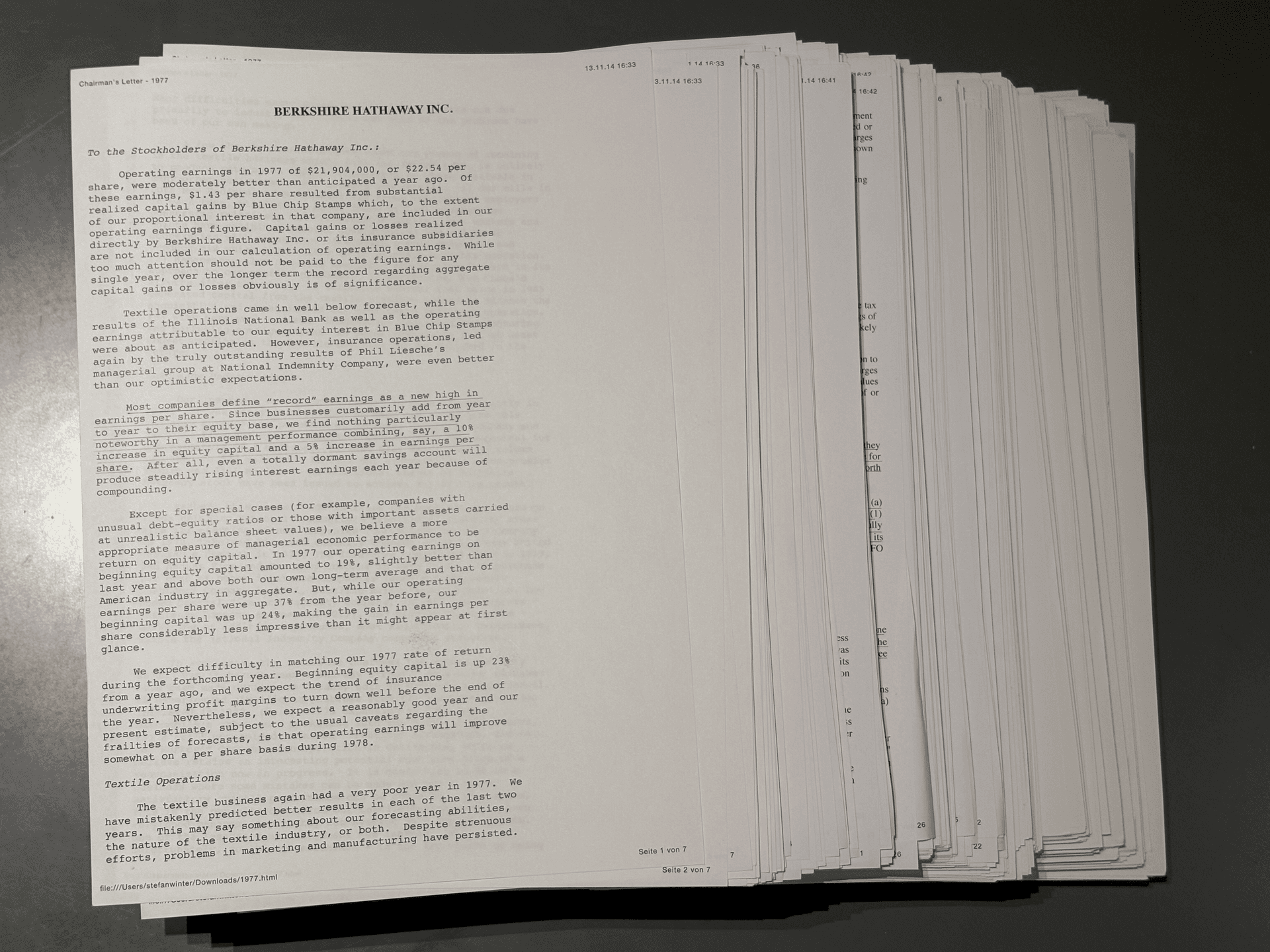The Timeless Investing Wisdom of Warren Buffett
Download a curated PDF summary of Warren Buffett's best shareholder letters. Handpicked highlights and key insights compiled for serious investors.
Download Your Free PDF Summary
The Best of Buffett's Letters in One Document

Enter your email to instantly download this comprehensive PDF summary—all the essential wisdom without reading thousands of pages
What You'll Discover Inside This PDF Summary
I personally read through all of Warren Buffett's shareholder letters, highlighted the most valuable insights, and compiled them into a concise PDF. This downloadable summary contains only the best sections from the investing GOAT—saving you hundreds of hours of reading.

Most companies define "record" earnings as a new high in earnings per share. Since businesses customarily add from year to year to their equity base, we find nothing particularly noteworthy in a management performance combining, say, a 10% increase in equity capital and a 5% increase in earnings per share.
We want the business to be (1) one that we can understand, (2) with favorable long-term prospects, (3) operated by honest and competent people, and (4) available at a very attractive price.
We make no attempt to predict how security markets will behave; successfully forecasting short term stock price movements is something we think neither we nor anyone else can do.
The textile industry illustrates in textbook style how producers of relatively undifferentiated goods in capital intensive businesses must earn inadequate returns except under conditions of tight supply or real shortage.
We are not at all unhappy when our wholly-owned businesses retain all of their earnings if they can utilize internally those funds at attractive rates. Why should we feel differently about retention of earnings by companies in which we hold small equity interests, but where the record indicates even better prospects for profitable employment of capital?
Both our operating and investment experience cause us to conclude that "turnarounds" seldom turn, and that the same energies and talent are much better employed in a good business purchased at a fair price than in a poor business purchased at a bargain price.
In large part, companies obtain the shareholder constituency that they seek and deserve. If they focus their thinking and communications on short-term results or short-term stock market consequences they will, in large part, attract shareholders who focus on the same factors.
Our conclusion is that, with few exceptions, when a management with a reputation for brilliance tackles a business with a reputation for poor fundamental economics, it is the reputation of the business that remains intact.
The reinsurance business continues to reflect the excesses and problems of the primary writers. Worse yet, it has the potential for magnifying such excesses.
We continually look for ways to employ large sums in each area. (But we try to avoid small commitments - "If something's not worth doing at all, it's not worth doing well".)
But inflation takes us through the looking glass into the upside-down world of Alice in Wonderland. When prices continuously rise, the "bad" business must retain every nickel that it can.
It's simply to say that managers and investors alike must understand that accounting numbers are the beginning, not the end, of business valuation.
The market, like the Lord, helps those who help themselves. But, unlike the Lord, the market does not forgive those who know not what they do.
Businesses in industries with both substantial over-capacity and a "commodity" product are prime candidates for profit troubles.
This is just a small preview. The full PDF summary contains dozens more handpicked insights spanning Buffett's entire career.
Download Complete PDF SummaryAbout Warren Buffett: The Oracle of Omaha
Understanding the man behind the wisdom makes these letters even more valuable
Early Life and Education
Warren Buffett young showed remarkable talent for business and investing from an early age. Born on August 30, 1930 (Warren Buffett birthday), in Omaha, Nebraska, he made his first stock purchase at age 11 and filed his first tax return at age 13, claiming his bicycle as a work expense for his paper route.
His voracious reading habit began early, and today Warren Buffett books recommendations are sought after by investors worldwide. He famously reads 500 pages a day and credits much of his success to continuous learning.
Family and Personal Life
Is Warren Buffett married? Yes, Warren Buffett was married to Susan Thompson Buffett from 1952 until her death in 2004. In 2006, he married his longtime companion Astrid Menks, who is now Warren Buffett wife. His first wife Susan remained close to Warren throughout their separation, and Astrid was accepted as part of their unconventional family arrangement.
Warren Buffett children include Susan Alice Buffett, Howard Graham Buffett, and Peter Andrew Buffett. Despite his immense wealth, Buffett has been famously frugal in raising his children, teaching them the value of money and hard work. His children have gone on to pursue their own successful careers in philanthropy, farming, and music.
The Legendary Partnership
The story of Warren Buffett and Charlie Munger is one of the most successful partnerships in business history. Meeting in 1959, their intellectual friendship and business collaboration transformed Berkshire Hathaway into one of the world's most valuable companies. Munger's influence shifted Buffett's investment philosophy from buying "fair companies at wonderful prices" to buying "wonderful companies at fair prices."
Their annual shareholder meetings, where both would answer questions for hours, became legendary events in the investment world. The wisdom shared in these meetings and in the shareholder letters represents decades of combined investing experience.
Political Views and Philanthropy
Regarding Warren Buffett political affiliation, he has been a longtime Democrat and supporter of progressive taxation policies. He's famously advocated for higher taxes on the wealthy, noting that he pays a lower tax rate than his secretary—a stance that led to the "Buffett Rule" proposal.
Beyond politics, Buffett has pledged to give away 99% of his wealth to philanthropic causes, primarily through the Bill & Melinda Gates Foundation. This commitment to giving, combined with his investment wisdom, makes his shareholder letters not just about making money, but about the responsible stewardship of capital.
These letters represent more than investment advice—they're insights from a lifetime dedicated to understanding business, human nature, and value creation.
Download the PDF Summary"Rule No. 1: Never lose money.— Warren Buffett
Rule No. 2: Never forget rule No. 1."
Join thousands of investors who have transformed their approach to investing with Buffett's timeless wisdom.
Get Your Free PDF Summary NowReady to Learn from the Master?
Download your free PDF summary of Warren Buffett's greatest shareholder letter insights and start applying his proven investment strategies today. All the essential wisdom, none of the fluff.